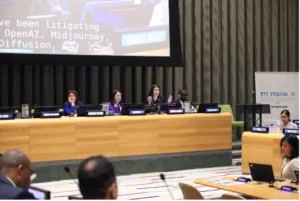Defined.ai CEO Dr. Daniela Braga Calls for AI Action at United Nations STI Forum
.13.05.2024
• The UN invited Dr. Daniela Braga to address the UN STI Forum opening remarks as a guest speaker
• Dr. Braga proposed actionable measures to steer AI development in alignment with the SDGs
• This speech represents Defined.ai’s commitment to ethical innovation and its contribution to sustainability and climate change
Seattle, WA – May 10, 2024 – Defined.ai, the world’s largest Ethical AI Marketplace, is proud to announce its CEO & Founder, Dr. Daniela Braga, delivered a keynote speech at the 9th Multi-stakeholder Forum on Science, Technology, and Innovation for the Sustainable Development Goals held at the United Nations Trusteeship Council Chamber in New York City.

Dr. Daniela Braga’s full speech below:
Distinguished General Assembly, representatives and delegates, ladies and gentlemen, it’s an honor to speak to you today about a topic I’ve been working on and passionate about for over two decades: Artificial Intelligence.
When I was looking at the specific focus of this forum and how AI can impact SDGs #1, #2, #13, #16, and #17, I honestly felt almost ashamed on behalf of the AI industry I have been helping to build. “And why?” – would you wonder. The big builders of AI, led by the United States, EU, UK, and China, have mostly been focused on winning the AI race between each other rather than collaborating to address any of the 17 human problems that the United Nations summarized in the Sustainable Development Goals.
And how is this race being disputed?
1. At the cost of multi-billion dollar investments applied to solve the same problems over and over for the same languages and the same regions. Since ChatGPT experienced a meteoric rise, amassing 1 million users within just five days of its launch in November 2022 (today it has over 180 million), several other LLMs (Large Language Models) have been released too: Google Bard, which is Gemini now, Llama by Meta, Claude by Anthropic, Pi by Inflection AI, Falcon, Mistral and many more. Today, we have hundreds of LLMs.
2. In the multimodal category, you see Open AI, Midjourney, and Stable Diffusion dominating the market, but many more are attempting and getting funding for it. Again, there are more redundancies. And don’t get me wrong — competition is good. But we’re talking about anything from $1B to $10B and more investment per model.
3. According to the AI Index Report 2024 published by the University of Stanford, the training costs of state-of-the-art AI models have reached unprecedented levels. For example, OpenAI’s GPT-4 used an estimated $78M worth of compute to train, while Google’s Gemini Ultra cost $191M for compute. Data centers alone already require about 1% of global electricity demand.
4. AI investment in 2023 was $154B across all industries, with the banking and retail sectors investing $40B combined.
5. Investment in Generative AI, a subcategory of AI, has risen almost 8x from 2022 to 2023 to reach $25B alone. Major players in the generative AI space, including OpenAI, Anthropic, Hugging Face, and Inflection, reported substantial fundraising rounds.
Don’t get me wrong — I love the AI field. It’s what gets me up in the morning every day for over two decades. I’m extremely encouraged by the progress and endless opportunities that AI and Gen AI bring to humanity in productivity enhancement, access to information, personalization in education, increased access to healthcare in regions where doctors are not enough, management and optimization of waste and energy consumption, monitoring climate change via satellite computer vision, smart buildings, autonomous vehicles, etc.
But at what cost?
1. At the cost of redundancy and imbalance of investments in the same applications compared to others, which can impact the SDG goals more directly.
2. At the cost of constant copyright infringement and threatening $150T market of content creators economy. Since mid of last year, we have seen countless articles in respected outlets bringing to light how the Authors Guild and other content creators team up and have been litigating against Open AI, MidJourney, and Stable Diffusion for scrapping “public content” from the internet to build these enormous models without consent or payment to the authors of this content and threatening their livelihood in the future. At every conference I attend, I hear these very heavily funded CEOs explaining how they have “taken” all the public data from the internet to build their foundation models.
3. Now, this race for data without permission is only broadening cultural, language, and gender imbalances because internet content is just a reflection of our society, full of biases and misinformation. The gap in digital content between the most spoken languages in the world and the rest of the world’s languages is enormous, threatening the continuity of so many languages and cultures worldwide.
4. This race also brings to light the digital exploitation of labor in developing and third-world countries by using people in the loop at $1/day to annotate non-safe-for-work data without the proper protocol of psychological support: work that nobody wants to do in the developed world, but it is critical to guardrail these models. Therefore, it should be properly paid for and supported.
5. The race for compute power and the cost of it is another barrier to the global south to catch up with this AI race.
6. At the cost of potential misinformation and disinformation and threatening democracies and people’s safety.
I come from a data angle in this AI puzzle. Eight years ago, I built a company focused on being the largest marketplace of ethically sourced training data for AI. The behavior of an AI model lies on the quality of the data that is trained with. This data must be consented to, paid for, unbiased, curated, and inclusive. While legislation in the US is sharply increasing, legislation worldwide is struggling to keep up.
So, how do we move from here?
1. There should be more incentives for those who build funds in AI towards the SDGs and, in particular, combat climate change: tax incentives, funding incentives, and collaboration incentives between the builders and the buyers of these technologies. I was pleased to see that Jeff Bezos announced a fund for AI and Climate Change of $100M in April this year. Again, this pales in front of the billions of Venture Capital and Private Equity poured into, once more, another redundant model. AI investment for sustainability is severely underfunded and under-resourced in terms of talent and entrepreneurial incentives or motivation.
2. There should be more education about data sourcing in our society. We see our customers ahead of legislation in these matters, being very careful about not scrapping the web, having consent, and so on. Still, the majority of the world continues to request web scrapping and appropriation of data without consent.
3. It’s critical to bring a diversity of countries and diversity of gender into the building of AI. Only 2% of women receive VC capital funding worldwide across all industries. When I raised our Series B, I became the woman in AI who raised the largest VC round in the world. But these numbers again pale when compared to my male peers. Unconscious bias continues to grow through our AI models and our VC markets, not addressing the real humankind issues, which we should all be doing.
4. It’s imperative to create frameworks for AI evaluation and responsible AI.
All of these recommendations must be driven by our governments and international organizations like the UN, with the interests of our planet and humankind in mind.
We have broken through AGI in AI. But we must focus our investments and existing technology less on redundancy and more on solving global problems like climate change.
I want to end this presentation by going back to the Greek myth of Prometheus, who stole the fire from Olympus to give it to humankind. Fire is the symbol of technology, of AI in our present day, and, therefore, civilization. It was a wonderful gift, but without the right guardrails or if kept in the hands of some and not all, it can be destructive or bring unforeseen consequences

To watch the 9th Multi-stakeholder Forum on Science, Technology, and Innovation for the Sustainable Development Goals, please visit https://webtv.un.org/en/asset/k1o/k1o74co7ic.
For more official photos for media purposes, please visit: https://www.flickr.com/photos/undesa/albums/72177720316807165/with/53708648182.

About Defined.ai
Defined.ai is building the world’s largest Ethical AI Marketplace. The company was established with the goal of providing superior AI data, tools, and services to genuinely answer customers’ questions in launching cutting-edge Artificial Intelligence systems. By sourcing, collecting, annotating, and evaluating data ethically and without bias, we provide a variety of products and services to help accelerate your Artificial Intelligence/Machine Learning projects, always taking into account your goals, needs, budgets, timelines, and business outcomes.
Defined.ai specializes in human-computer interaction for Speech & Natural Language Processing, computer vision, and computer translation, offering ready-to-use and customized data products, Crowd-as-a-Service, human evaluation services, and end-to-end solutions. Our products are supported by the Neevo platform, with over one million employees in over 100 countries, speaking over 70 languages – all regularly vetted, certified, and segmented to meet your specific needs.
Defined.ai has offices in Seattle, USA, Lisbon, and Porto, Portugal, and has raised over $80 million in investment.
